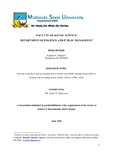Please use this identifier to cite or link to this item:
https://cris.library.msu.ac.zw//handle/11408/3053| Title: | The role of the East African Standby Force (EASF) and SADC Standby Force (SSF) in dealing with recurring armed conflict in Kivu, 1998 – 2016 | Authors: | Manjoro, Stephen N. | Keywords: | Armed conflict Peace Sustainable developmental |
Issue Date: | 2016 | Publisher: | Midlands State University | Abstract: | The research attempts to proffer solution to an armed conflict whose perpetuity is crippling and stifling Africa’s peace, security and sustainable developmental thrust. Using both qualitative and quantitative research methods through interviews and questionnaires respectively, and buoyed by an encompassing literature review the research set-out to proffer solution in arresting recurrent armed conflict in eastern Congo. The solution is the role of East African Standby Force (EASF) and the SADC Standby Force (SSF) under the authority and command of the African Standby Force (ASF); can play in dealing with armed conflict in Kivu. The collective security theory was used to provide a guideline and framework within which the envisioned synergy of regional Forces can work in bringing to an end an armed conflict that has spelt-out dire consequences towards African aspirations towards development. The researcher concluded that; African mechanisms towards peace and security need to be given all the internal support Africa through the African Union (AU) can muster in making the ASF viable, vibrant and vigilant in attending to Africa’s endemic crises such as the continued unrest in Kivu. Further, the researcher argues that; “bringing an end to the Kivu unrest will bode well for African aspirations towards meeting her developmental pathway ensconced in declarations such as Agenda 2063”. Finally, the researcher calls on the AU to institute contributions of US$ 2 million each from Member States towards making Africa less reliant on foreign funding. The contributions are reasonable and within the capacity of AU Member States to contribute towards the realisation of making the ASF a reality. US$ 2 million is a modest figure, considering how much money Africa’s economies lose out through international crime, for example. Thus, it is the thrust of this paper to advocate the institution of home-grown solutions to home-grown problems. | URI: | http://hdl.handle.net/11408/3053 |
| Appears in Collections: | Master of Science in International Affairs Degree |
Files in This Item:
| File | Description | Size | Format | |
|---|---|---|---|---|
| Master of Science in International Affairs Degree.pdf | Full Text | 1.95 MB | Adobe PDF |  View/Open |
Items in MSUIR are protected by copyright, with all rights reserved, unless otherwise indicated.



